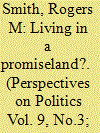| Srl | Item |
| 1 |
ID:
110952


|
|
|
|
|
| Publication |
2011.
|
| Summary/Abstract |
Controversies over Mexican immigrants and undocumented aliens in Arizona and elsewhere show the need for fresh approaches to immigration. The "principle of constituted identities" holds that the more a government has coercively constituted the identities of non-citizens in ways that have made having certain relationships to it fundamental to their capacities to lead free and meaningful lives, the greater the obligations that government has to facilitate those relationships-all else being equal. The U.S. has coercively constituted the identities of many persons of Mexican descent, inside and outside its boundaries, in ways that have fostered aspirations for dual economic, cultural, and political "citizenships." It has also shaped the identities, values, and interests of many whites in immigrant-receiving states in ways that make Mexican immigrants seem threatening, even as it has made those states pay most of the costs of absorbing immigrants. In consequence, the U.S. should adopt policies that give priority to Mexicans in immigration and that facilitate dual citizenships, while providing more aid to immigrant-receiving states.
|
|
|
|
|
|
|
|
|
|
|
|
|
|
|
|
| 2 |
ID:
110955


|
|
|
|
|
| Publication |
2011.
|
| Summary/Abstract |
The provocative question raised by Rogers Smith's "Living in a Promiseland? Mexican Immigration and American Obligations" is whether the tortured history of U.S.-Mexican relations and the racialized context of Mexican immigrant reception can best be ameliorated through targeted immigration policies that would create added opportunities for Mexican migrants relative to others. I argue that the current, more universally-principled system of U.S. immigration policy, supplemented by an inclusive legalization program, can better serve the needs of potential Mexican migrants and Mexican immigrants resident in the United States. Also, I am more skeptical than Smith is about the depths of Mexico's commitment to seeking binational strategies to address the needs of its émigrés abroad.
|
|
|
|
|
|
|
|
|
|
|
|
|
|
|
|